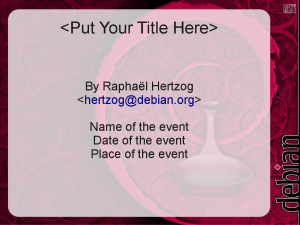 I’m attending the mini-Debconf Paris and I just gave a talk about the latest improvement of dpkg-dev—the package providing the basic tools used to build Debian packages. Latest is a bit stretched since it embraces the last 2-3 years of development.
I’m attending the mini-Debconf Paris and I just gave a talk about the latest improvement of dpkg-dev—the package providing the basic tools used to build Debian packages. Latest is a bit stretched since it embraces the last 2-3 years of development.
My talk covered the following topics:
- Support of symbols files by dpkg-shlibdeps, dpkg-gensymbols
- Support of new source formats by dpkg-source
- Supplementary options for dpkg-source
- Cross distribution collaboration with dpkg-vendor
- Custom compilation flags with dpkg-buildflags
- Miscellaneous improvements to other tools
The slides are relatively verbose so that you can understand them even if you did not attend the talk. Click here to get the slides.
Related links
This section points to various articles that cover more extensively some of the features mentioned in my talk.
Concerning dpkg-source:
- About new source formats
- How to customize dpkg-source’s behaviour in your Debian source package
- How to create Debian packages with alternative compression methods
- How to use multiple upstream tarballs in Debian source packages?
- Managing distribution-specific patches with a common source package
Concerning dpkg-maintscript-helper:
- Correctly renaming a conffile in Debian package maintainer scripts
- The right way to remove an obsolete conffile in a Debian package
Concerning dpkg-vendor:

 While I have spent countless hours working on the new source format known as “3.0 (quilt)”, I’ve just realized that I have never blogged about its features and the reasons that lead me to work on it. Let’s fix this.
While I have spent countless hours working on the new source format known as “3.0 (quilt)”, I’ve just realized that I have never blogged about its features and the reasons that lead me to work on it. Let’s fix this.